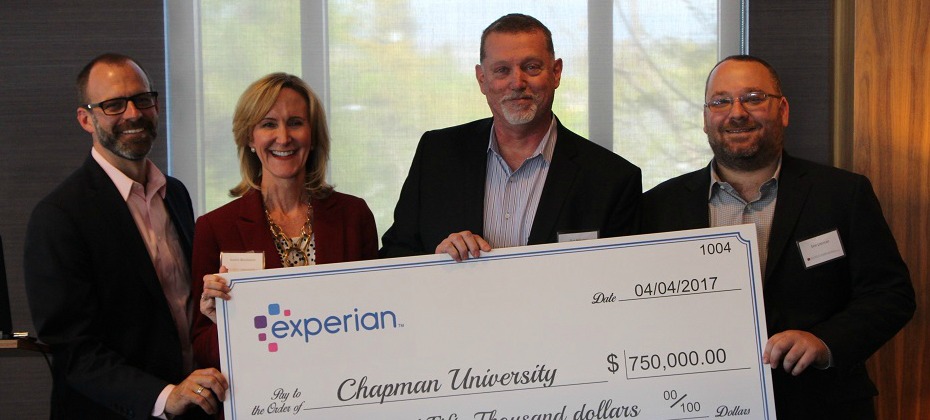Tech & Innovation

At Experian, we are continually innovating and using technology to find solutions to global issues, modernize the financial services industry and increase financial access for all.
DEI

Our deep commitment to social and financial inclusion is reflected in our workplace culture, our partnerships and our efforts to break down the barriers to financial equity.
Financial Health

Our initiatives are dedicated to getting tools, resources and information to underserved communities so that consumers can best understand and improve their financial health.
Latest Posts:

I recently attended a conference in Alwar, India, hosted by Experian and the International Finance Corporation. During one of the sessions, I met a single mother of two who had recently moved to a rural village in India. Her husband had left her and she was hoping to pick up work as a tailor once she purchased a sewing machine to support her family. As we talked, she confided in me that she was having trouble securing a loan from microfinance institutions because she didn’t have papers to prove her identity. And since she was new to the village, no one knew who she was. Without a proven identity, she couldn’t qualify for a loan and get the money she needed to support herself and feed her children. Indian banks predominantly serve urban customers whose credit reports are extensive. However, most customers from smaller districts and rural towns – like this woman – can fit their credit history on less than a page. Identification may be the only way they can verify their character to secure a loan. As I sat with this woman, I started telling her about our Prove ID tool that I had recently helped to develop. Using an individual’s biometrics, the tool would search her credit history, bank card and any information that can prove she is who she claimed to be. I explained that by using this tool, she could now prove what village she’s from, that she was a permanent resident in her new village and that she was likely to repay her loan. She was stunned and overwhelmed. In that moment, I realized that rural clients often need human connection to clearly understand what a bank or microfinance institution requires in order to obtain a loan. Many rural customers can’t read the brochures or pamphlets sitting in a bank, but by engaging them in conversation, you can effectively educate them about how to prove their identities and build their credit profiles to successfully access the finances they need. As a Product Developer for banks, I sometimes get so caught up on how to make products run that I lose sight of how the work I do impacts the community. Helping one woman discover Prove-ID to secure a loan and provide for her family inspired me. I want to continue being more involved in my community to help others who may not be literate learn how to prove their identities so they can better support their families.

The field of data science is still in its infancy. Every day, new advancements are helping to yield more exciting results. We’re learning how data can allow cities to provide more effective services for residents, how it can help to solve vexing health riddles, and how companies can leverage data to better serve consumers. But for advancements to be achieved, collaboration between research institutions and the private sector is essential. Even more essential is ensuring that the next generation of data scientists are equipped with the latest knowledge and resources to continue to advance the field. That’s why we are excited to announce Experian’s $750,000 gift to create the Experian Assistant Professorship in Machine Learning at Chapman University, which will be used to expand machine learning opportunities at Chapman University’s Machine Learning and Assistive Technology Lab (MLAT), where Chapman researchers use big data and technology to address challenges of social significance like autism. We believe this investment is a necessary step in an ongoing commitment to ensure our Southern California community continues to fuel economic growth by ensuring that businesses like Experian have the talent to advance field of information services. The assistant professorship will be held by Erik Linstead, Ph.D., the director of the undergraduate computing programs in computer science, software engineering, and data analytics. Dr. Linstead, one of the nation’s leading authorities on big data, is also the principal investigator MLAT. Experian has learned the value of attracting data scientists with a wide degree of interests, backgrounds, and professional experiences to help assist our clients best serve consumers. Similarly, MLAT seeks to do the same. Projects that they take on range from bioinformatics and molecular biology to machine learning and artificial intelligence. Experian’s gift will help MLAT to expand their data science-focused efforts into new fields. This gift is the latest of a long series of collaborations between Chapman and Experian. Several years ago, Experian and Chapman began a partnership that involved placing graduate students training to become data scientists in internships within Experian to provide them real-world, hands on training. Since then, the partnership has blossomed to include embedding a Chapman faculty member within Experian to better ground the academic community on how data scientists work within the private sector to better shape their curriculum. We’ve also supported scholarships and programs at Chapman to ensure that the field of data science remains inclusive, diverse, and talented. Data science will inevitably continue to have a growing impact on our lives. This gift is a commitment to the future of data science and the promise of a better tomorrow that it holds. We wish a congratulations to Dr. Linstead, and look forward to a continued stream of talent emerging from Chapman to continue to advance the field and produce better outcomes for everyone. Photo of the check presentation courtesy of Christopher Simonson. Pictured (L-R): Dean of Schmid College of Science and Technology Andrew Lyon, EVP of University Advancement Sheryl Bourgeois, President of Experian Consumer Services Guy Abramo and Principal Investigator of the MLAT Lab Erik Linstead.

Spanish Translation I’m a Senior Product Manager in Experian’s Fraud and Identity Solutions department, which means I partner with data scientists to protect banks and their customers from fraud. When most people think of fraud, they envision someone trying to open a bank account in someone else’s name. However, it wasn’t until I did a series of customer visits with big banks to understand their struggles and discovered a pervasive form of fraud in the finance industry called “bust-out” fraud. In a "bust-out" fraud, an individual applies for a credit card in their own name, establishes a normal usage pattern and builds a solid repayment history. Then, when they’re ready to execute their scam, they max out all their available lines of credit from various lenders, disappear and leave the banks with the losses. Meanwhile, the money could be funneled into funding many types of organized crime, from human trafficking to drug trading and other illicit activities. What makes this type of crime all the harder to identify and catch before it occurs is that the person applying for a credit card is who they say they are. So it’s not about identity theft. To address this issue, my team and I created a solution called BustOut ScoreSM. We began by reviewing data from different banks to identify patterns where bust-outs occurred. From there, we built a score that predicts the likelihood that an individual will execute the scam — months before the scam occurs. Our clients now use this tool both when opening new accounts and as part of account management. The tool flags suspicious-looking accounts, which our team then manually reviews to evaluate if the account is truly at risk for a bust-out. If it is, we work with our clients to freeze or close out those suspicious accounts. Finding solutions to a fraud problem that hasn’t been solved is probably my favorite part of the job. I love seeing products that solve real issues affecting real people come to life — from inception to launch. Helping protect people from identity theft and fraud is what gives me purpose and meaning in my work. I am proud to use the power of data as a force for good.

There’s no arguing the importance of data to the marketing industry, but it’s equally important for marketers to leverage data in a responsible manner. On March 22, the Data & Marketing Association (DMA) held the Dynamic State of Data conference in Washington, D.C. to highlight critical public policy initiatives the industry is currently engaged in Congress and state legislatures across the country. The conference included remarks from Senator Thom Tillis (R-N.C.) and Federal Trade Commission Chairwoman Maureen Ohlhausen on their views of why data driven marketing is vital to our nation’s economic engine. Additionally, Liz Oesterle, Experian’s Senior Director for Government Affairs and Public Policy, participated in a panel discussion on the DMA’s Data Standards 2.0 initiative. The Data Standards 2.0 will tackle new high profile and emergent data issues, and update DMA’s marketing compliance standards – DMA’s Guidelines for Ethical Business Practice – focusing them to be more relevant for today’s data practices. During the panel, Oesterle outlined why industry self-regulation and the Data Standards 2.0 initiative is critical for responsible information sharing. In addition to providing business and compliance teams with certainty, Oesterle said “self-regulation helps to get in front of potential legislative and regulatory action by demonstrating to policymakers the industry is able to address any potential issues.” Stu Ingis, a Partner at Venable and DMA’s Legal Counsel, also participated in the panel. Ingis provided background on the Data Standards 2.0 initiative and discussed some of the areas in which the updates are expected to address, including cross-device tracking; data security; compliance with health and children’s data privacy; onboarding; and the Internet of Things. "Experian believes that self-regulation, like the DMA Data Standards 2.0, strengthens consumer protections, allows for responsible innovation and creates regulatory certainty,” said Oesterle. Photo courtesy of: The Data & Marketing Association

I’m a Business Systems Specialist on Experian’s Information Technology Services team. While the work I do is largely behind the scenes, the data I process helps power advertising campaigns, provide accurate credit score reports to consumers and enable people who might not otherwise have access to credit to achieve their goals. The most valuable thing I can provide the businesses Experian works with is accurate data, because data is the backbone of a business. I run systems and support software that helps process the data for Experian’s products and services, and work to ensure businesses have access to the most accurate data sets. Businesses from across different sectors send us data about their consumers—like if an individual paid rent or a bill on time — that we update into our databases so that when that person applies for a loan or to rent an apartment, our data is timely and accurately reflects that individual’s true credit score. Accuracy can be the difference between a person getting a lease or having to look elsewhere. The data I help process and service is used for other business purposes as well, like advertising campaigns. Marketers will send us a list of the demographics they’re looking to reach. I help aggregate and compare those lists of demographics against the data we already have on hand to provide that client with an accurate list of addresses. Armed with that timely, accurate information, those businesses can reach their target audience and increase revenue for that quarter – and consumers benefit from more targeted messaging from companies they care about. I joined Experian more than 20 years ago, and have seen it evolve and grow from essentially a traditional credit bureau to a global information services enterprise. For me, the extent to which we as a company can provide services that empower consumers to succeed on their life’s journey has always been the end deliverable. Read more #ExperianStories from our colleagues around the world.

International Women's Day is all about celebration, reflection, advocacy, and action. At Experian, we work hard to create a culture of inclusion as we believe the diversity of our skills and life experiences allow us to better serve our clients. With this in mind, our campuses around the world curated a programme of inspiring speakers, workshops and tours to highlight the opportunities that are available to women in the technology sector. Women across Brazil, Colombia, Costa Rica, United States and the United Kingdom had the opportunity to hear from women leaders across our organisations. Below are just some of the events that took place across our regions to celebrate International Women's Day: Brazil Brazil hosted an impressive panel of influential women both from within Experian and other organisations including: Banco Original and U.N. Women. The ‘Inspiring Girls in IT’ event was attended by girls from local schools as well relatives of Experian employees. “People used to say that IT was the future and I wanted to be economically independent,” said Hewlett Packard Bell’s Claudia Braga speaking at Experian’s Women in IT event in Brazil. The panel debate and workshops gave the girls an insight into career opportunities within IT as well as a chance to learn from woman who have already forged a successful career in the sector. Colombia As well as hosting an event for young women to learn more about technical careers, our Colombia office also released a special edition of its quarterly Credit Indicators Newsletter focusing on women and credit. One of the key findings from the report found that 1 in every 5 new credit lines is given to female micro- entrepreneurs — who doubled their loans in the real sector. There’s also a whopping 62% annual growth of revenue-generating credit products for women between the first quarter of 2015 and the third quarter of 2016. “When it comes to credit and entrepreneurship in Colombia, we can certainly say the future is female,” said Mauricio Angulo, Experian’s managing director for Spanish LATAM. Costa Rica To celebrate International Women's Day, our Costa Rica campus invited four women from their IT department to share their stories on why they pursued a career in IT. The panel included: Lead de Quality Assurance and Compliance Tatiana Salazar; Software QA Analyst and President of Experian´s Employee Solidarist Association, Cindy Vargas; GSA Client Apps Manager, María Valverde; and Lead de Service and Delivery team, Monica Barrantes. England Four of our UK offices took the opportunity to celebrate International Women’s Day by holding local events as part of their 'Women in Experience' networks. In Nottingham, the team invited senior women for Experian to share their success stories with local girls; it was also a chance for the girls to find out more about Experian’s culture and career opportunities. The women in our EITS office held a lunch and learn session with young girls from the area to share job insights and offer advice on how to secure a position in the tech industry. As part of the celebration, the UK team also took the opportunity to sit down with some of the innovative women who work within Experian to glean some insight into how they overcame adversity in what is considered a male dominated industry. Laura Blackwell who works within our IT Service shared her advice on how women can secure a job in IT. “Stick to your guns, even in the face of adversity. If you enjoy doing IT, don’t let anything put you off achieving your dreams. It’s also a good idea to find a company to work for that will allow you the sort of flexibility to learn about different disciplines that I’ve found here at Experian.” United States Our team in Costa Mesa, California held a ‘Women in Experian' Expo, which included an executive speaker panel who shared their insights and thoughts on this year's event theme 'Be Bold for Change.' From awareness-raising to concrete action, attendees learned about how these executives demonstrated boldness in their careers to eliminate bias and foster inclusive work cultures. Hiq Lee, President of Experian’s Business Information Services Unit shared her own experiences on how she secured her role at Experian and offered some advice for young women in the audience on how to ask for workplace opportunities: “You are deserving of every opportunity,” said Hiq Lee, President of Experian’s Business Information Services Unit speaking to young women at Experian’s North American event. The IWD event in Costa Mesa was streamed live on Periscope and clips from sessions from both Brazil and the United States were featured on Snapchat. The team in Allen, Texas encouraged Experian employees to bring their daughters, nieces and sisters to their ‘Future Female Technologists’ event. The panel included top female Experian employees to share their insights and expertise about how to pursue a career in technology. DeMarcus Brown, who works within Enterprise Systems Management, and Jessie Montano from our Firewall team provided an update to the girls on the range of Early Career options available at Experian. We’d like to thank all of our teams from across the globe for their commitment to helping women and girls achieve their ambitions. Our role in promoting gender equality is increasingly important and we will continue to dedicate our time and resources to help women lead.

As part of Credit Awareness Week, Experian and Credit Strategy are launching a new credit refusal pathfinder to help people understand the lending process and how they can tackle a credit refusal. It can be a real pain when you make an unsuccessful credit application, especially when you can’t see why you were refused. “But I’ve got a good credit score!”, “But I pay all my bills on time!”, “But I don’t even have a credit card!” people may say. When you apply for a credit card, loan or even a mobile phone contract, it’s up to the lender to decide whether or not to offer you credit – and they have varying methods to work out if you’re eligible. New research from Credit Strategy, Experian and the CFA* has found a whopping 86% say that they should be offered a clearer explanation about why they have been declined credit. Many people completely misunderstand the credit-decision-making process; 26% of UK adults wrongly think the credit reference agency makes the decision to turn down applications for a loan, while 32% think credit reference agencies decide to approve credit cards. The reality is that lenders decide which customers to accept and refuse, with one or more credit reference agency simply providing information to help the decision. In fact, industry guidelines require lenders to tell people the main reason for refusing credit, but only if they ask. Does being refused credit affect your credit score? The research also found that 75% of the population think that being refused credit affects your credit score. Being refused for credit is not, in itself, hazardous for your credit score. While your credit report will show that you applied for a credit card – it stays on for a year – it won’t actually show whether or not you were accepted. However, credit refusal can often lead to more attempts to get credit – and making a lot of applications in a short space of time could have a serious impact on your credit score, and your ability to get credit in the future. Some common reasons to be refused credit: You’ve missed or made late credit payments recently, which show up on your credit report You’ve had a default or a CCJ in the past six years, which will show up on your credit report You’ve made too many credit applications in a short space of time in the past six months There are mistakes such as incorrect addresses or other errors on your application form You may not fall into the target bracket for the type of credit you’ve applied for Your Experian UK Credit Score tells you how lenders may view you, which is useful when you apply for credit – and is FREE FOREVER. The higher your credit score, the more chance of being accepted for credit, at the best rates. * Conducted by YouGov on behalf of Credit Strategy, Experian and the Consumer Finance Association (CFA), 10th – 13th March 2017

Experian and Finicity are announcing a partnership that promises to transform the consumer and lender experience and bring it into the 21st century. By partnering with Finicity, we are leveraging our combined capabilities – their industry-leading 16,000 connections throughout the financial services field and Experian’s Decisioning as a Service platform, to be the first credit bureau that can digitize the loan asset and income verification steps of the underwriting process for consumers and lenders.

I’m a Senior Vice President of Sales, responsible for leading Experian Health’s teams as they assist hospitals, physicians, labs and pharmacies across the U.S. We provide technology for providers and patients to help keep the costs and payment processing component of healthcare easy and transparent. The part of my work I am most passionate about, however, is our efforts to decrease identity theft in healthcare. Medical identity theft is one of the fastest growing areas of identity fraud in the world. With everything moving online at a fast pace, health care providers may not always keep up with the protections needed with new technologies. Unfortunately, that means hackers can sometimes acquire a patient’s personal information – name, Social Security number, health insurance number – to illegally obtain medical services or devices, insurance reimbursements or prescription drugs. One of the biggest issues with this type of fraud is that it leaves its victims with little to no recourse for recovery. They often experience financial repercussions and discover that faulty information has been added to their personal medical files as a result. To address this issue, my team and I partnered with Experian’s Decision Analytics team to create a new tool that protects patients’ online portals in much the same way that banks have protected their online clients for years. Additionally, our team is the in process of launching a Universal Identity Matching solution – a unique PIN which acts like the Social Security Number for your health care information. As more health care companies begin to adopt it, this PIN will be the one thing you will need to carry with you, as it will be your unique identifier for all your health care experiences. A lot of processes in hospitals today are still manual, but I want to change that. I want to automate systems so hospital staff can focus on where they are most needed. I am proud to work at a company that’s at the forefront of solving the major problems in healthcare IT. Being able to provide technological solutions in an industry where you can directly see the benefit is both personally and professionally rewarding. Read more #ExperianStories from our colleagues around the world.


